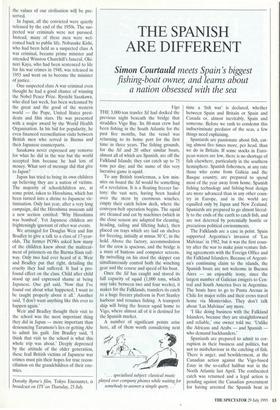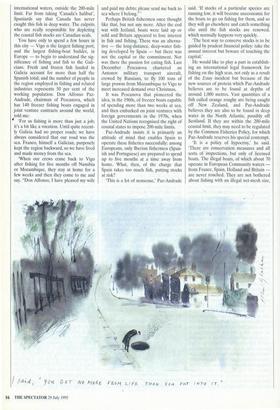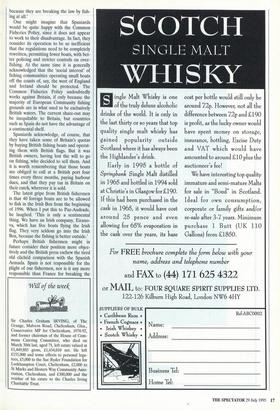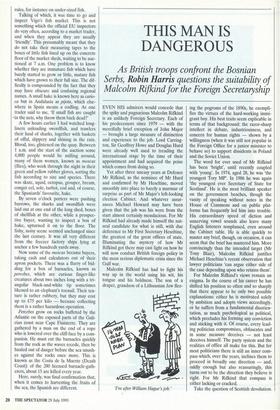THE SPANISH ARE DIFFERENT
Simon Courtauld meets Spain's biggest
fishing-boat owner, and learns about a nation obsessed with the sea
Vigo THE 3,000-ton trawler Sil had docked the previous night beneath the bridge that straddles Vigo Bay. Its 80-man crew had been fishing in the South Atlantic for the past five months, but the vessel was returning to its home port for the first time in three years. The fishing grounds, for the Sil and 20 other similar boats, almost all of which are Spanish, are off the Falkland Islands; they can catch up to 75 tons per day; and the name of this very lucrative game is squid.
To any British trawlerman, a few min- utes on board the Sil would be something of a revelation. It is a floating freezer fac- tory: the vast nets, having been hauled over the stern by enormous winches, empty their catch below deck, where the conveyor-belt operation begins. The squid are cleaned and cut by machines (which in the close season are adapted for cleaning, heading, tailing and filleting hake), then placed on trays which are laid on shelves for freezing, initially at minus 30°C, in the hold. Above the factory, accommodation for the crew is spacious, and the bridge is a mass of buttons and computer screens. By swivelling on his stool the skipper can simultaneously control both the winching gear and the course and speed of his boat.
Once the Sil has caught and stored its full capacity of squid (1,000 tons, which may take between two and four weeks), it makes for the Falklands, transfers its catch to a huge freezer platform in Port Stanley harbour and resumes fishing. A transport ship will bring the frozen squid home to Vigo, where almost all of it is destined for the Spanish market.
A number of significant points arise here, all of them worth considering next . . . specialised subject: classical music played over company phones while waiting for somebody to answer a simple query. . time a 'fish war' is declared, whether between Spain and Britain or Spain and Canada or, almost inevitably, Spain and someone. Before we rush to condemn this indiscriminate predator of the seas, a few things need explaining.
Spaniards are passionate about fish, eat- ing almost five times more, per head, than we do in Britain. If some stocks in Euro- pean waters are low, there is no shortage of fish elsewhere, particularly in the southern hemisphere. Spanish fishermen, at any rate those who come from Galicia and the Basque country, are prepared to spend most of the year away from home. Spanish fishing technology and fishing-boat design are more advanced than in any other coun- try in Europe, and in the world are equalled only by Japan and New Zealand. Spaniards are prepared to go almost literal- ly to the ends of the earth to catch fish, and are not deterred by potentially hostile or precarious political environments.
The Falklands are a case in point. Spain supported Argentina's invasion of 'Las Malvinas' in 1982, but it was the first coun- try after the war to make joint venture fish- ing agreements with the Foreign Office and the Falkland Islanders. Because of Argenti- na's continuing claim to the islands, the Spanish boats are not welcome in Buenos Aires — an enjoyable irony, since the largest number of Galician émigrés to Cen- tral and South America lives in Argentina. The boats have to go to Punta Arenas in Chile for major refits and their crews travel home via Montevideo. They don't talk about 'Las Malvinas' any more.
`I like doing business with the Falkland Islanders, because they are straightforward and reliable,' one owner told me. 'Unlike the Africans and Arabs — and Spanish who demand backhanders.'
Spaniards are prepared to admit to cor- ruption in their business and politics, but not to misbehaviour in the catching of fish.
There is anger, and bewilderment, at the Canadian action against the Vigo-based Estay in the so-called halibut war in the North Atlantic last April. The confiscated
catch was returned and a legal action is pending against the Canadian government for having arrested the Spanish boat in international waters, outside the 200-mile limit. Far from taking 'Canada's halibut', Spaniards say that Canada has never caught this fish in deep water. The culprits who are really responsible for depleting the coastal fish stocks are Canadian seals.
You have only to spend a few hours in this city — Vigo is the largest fishing port, and the largest fishing-boat builder, in Europe — to begin to understand the sig- nificance of fishing and fish to the Gali- cians. Fresh and frozen fish landed in Galicia account for more than half the Spanish total; and the number of people in the region employed in fishing and related industries represents 50 per cent of the working population. Don Alfonso Paz- Andrade, chairman of Pescanova, which has 140 freezer fishing boats engaged in joint venture contracts around the world, told me: `For us fishing is more than just a job; it's a bit like a vocation. Until quite recent- ly Galicia had no proper roads; we have always considered that our road was the sea. Franco, himself a Galician, purposely kept the region backward, so we have lived and made money from the sea.
`When our crews come back to Vigo after fishing for five months off Namibia or Mozambique, they stay at home for a few weeks and then they come to me and say, "Don Alfonso, I have pleased my wife and paid my debts; please send me back to sea where I belong."' Perhaps British fishermen once thought like that, but not any more. After the cod war with Iceland, boats were laid up or sold and Britain appeared to lose interest in fish and fishing. There was an alterna- tive — the long-distance, deep-water fish- ing developed by Spain — but there was not the capital or the commitment. Nor was there the passion for eating fish. Last December Pescanova chartered an Antonov military transport aircraft, crewed by Russians, to fly 100 tons of large prawns from Mozambique to Vigo to meet increased demand over Christmas.
It was Pescanova that pioneered the idea, in the 1960s, of freezer boats capable of spending more than two weeks at sea, and then embarked on joint ventures with foreign governments in the 1970s, when the United Nations recognised the right of coastal states to impose 200-mile limits.
Paz-Andrade insists it is primarily an attitude of mind that enables Spain to operate these fisheries successfully: among Europeans, only Iberian fishermen (Span- ish and Portuguese) are prepared to spend up to five months at a time away from home. What, then, of the charge that Spain takes too much fish, putting stocks at risk?
`This is a lot of nonsense,' Paz-Andrade said. 'If stocks of a particular species are running low, it will become uneconomic for the boats to go on fishing for them, and so they will go elsewhere and catch something else until the fish stocks are renewed, which normally happens very quickly.
The best way to conserve stocks is to be guided by prudent financial policy: take the annual interest but beware of touching the capital.'
He would like to play a• part in establish- ing an international legal framework for fishing on the high seas, not only as a result of the Estay incident but because of the new sources of protein which Paz-Andrade believes are to be found at depths of around 1,000 metres. Vast quantities of a fish called orange roughy are being caught off New Zealand, and Paz-Andrade believes they are also to be found in deep water in the North Atlantic, possibly off Scotland. If they are within the 200-mile coastal limit, they may need to be regulated by the Common Fisheries Policy, for which Paz-Andrade reserves his special contempt.
`It is a policy of hypocrisy,' he said. `There are conservation measures and all sorts of inspections, but only of licensed boats. The illegal boats, of which about 70 operate in European Community waters from France, Spain, Holland and Britain are never touched. They are not bothered about fishing with an illegal net-mesh size, J(1-1 d y014 &ET NO ltio2e FRom LIFE. ri4A-N you por Iwra IT. 1
because they are breaking the law by fish- ing at all.'
One might imagine that Spaniards would be quite happy with the Common Fisheries Policy, since it does not appear to work to their disadvantage. In fact, they consider its operation to be so inefficient that the regulations need to be completely rewritten, permitting fewer boats, with bet- ter policing and stricter controls on over- fishing. At the same time it is generally acknowledged that the 'social interest' of fishing communities operating small boats off the coasts of, say, the west of England and Ireland should he protected. The Common Fisheries Policy undoubtedly works against Britain, if only because the majority of European Community fishing grounds are in what used to be exclusively British waters. The current share-out may be inequitable to Britain, but countries such as Spain do not have the advantage of a continental shelf.
Spaniards acknowledge, of course, that they have taken some of Britain's quotas by buying British fishing boats and operat- ing them with British flags. But it was British owners, having lost the will to go on fishing, who decided to sell them. And it is worth remembering that those boats are obliged to call at a British port four times every three months, paying harbour dues, and that they pay tax in Britain on their catch, wherever it is sold.
The latest gripe from British fishermen is that 40 foreign boats are to be allowed to fish in the Irish Box from the beginning of 1996. When I put this to Paz-Andrade, he laughed. 'This is only a sentimental thing. We have an Irish company, Eirano- va, which has five boats flying the Irish flag. They very seldom go into the Irish Box, because the fishing is better outside.'
Perhaps British fishermen might in future consider their position more objec- tively and the British press eschew the tired old cliched comparison with the Spanish Armada. Spain is not responsible for the plight of our fishermen, nor is it any more responsible than France for breaking the rules, for instance on under-sized fish.
Talking of which, it was time to go and inspect Vigo's fish market. This is not something which the official EU inspectors do very often, according to a market trader, and when they appear they are usually `friendly'. This presumably meant that they do not take their measuring tapes to the boxes of little fish lined up on the concrete floor of the market sheds, waiting to be auc- tioned at 7 a.m. One problem is to know whether they are immature fish which have barely started to grow or little, mature fish which have grown to their full size. The dif- ficulty is compounded by the fact that they may have obscure and confusing regional names. A small hake is known here as cario- ca but in Andalusia as pijota, which else- where in Spain means a codling. As one trader said to me, `If small fish are caught /in the nets, why throw them back dead?'
A few hours earlier I had watched long- liners unloading swordfish, and trawlers their haul of sharks, together with baskets of offal, slippery and shining in the rain. Blood, too, glistened on the quay. Between 1 a.m. and the start of the auction some 4,000 people would be milling around, many of them women, known as moscas (flies), who work through the night in their green and yellow rubber gloves, sorting the fish according to size and species. There was skate, squid, octopus, grouper, bream, conger eel, sole, turbot, cod and, of course, the Spaniards' favourite, hake.
By seven o'clock porters were pushing barrows, the sharks and swordfish were laid out at one end of the long shed, boxes of shellfish at the other, while a prospec- tive buyer, wanting to inspect a box of hake, upturned it on to the floor. The fishy, noisy scene seemed unchanged since the last century. It was all very different from the freezer factory ships lying at anchor a few hundreds yards away.
Now some of the moscas became buyers, taking cash and calculators out of their apron pockets. There was a flurry of bid- ding for a box of barnacles, known as percebes, which are curious finger-like creatures about two inches long with a tri- angular black-and-white tip sometimes likened to an elephant's toenail. Their tex- ture is rather rubbery, but they may cost up to £75 per kilo — because collecting them is a rather hazardous operation.
Percebes grow on rocks buffeted by the Atlantic on the exposed parts of the Gali- cian coast near Cape Finisterre. They are gathered by a man on the end of a rope who is lowered over the cliff-face by a com- panion. He must cut the barnacles quickly from the rock as the waves recede, then be hauled out of danger before the sea smash- es against the rocks once more. This is known as the Costa de la Muerte (Death Coast): of the 200 licensed barnacle-gath- erers, about 15 are killed every year.
Here, surely, was final confirmation that, when it comes to harvesting the fruits of the sea, the Spanish are different.





















































 Previous page
Previous page